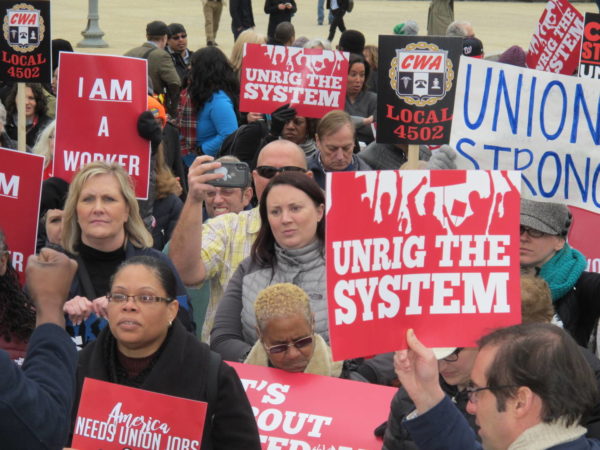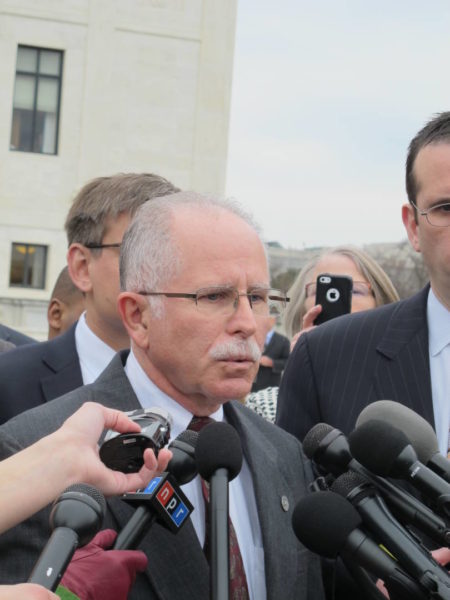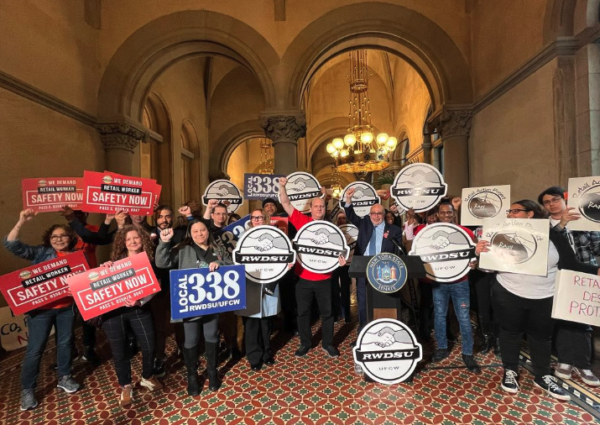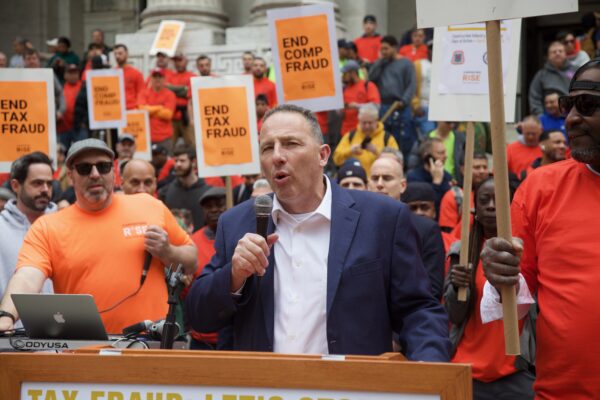WASHINGTON—Under marble Greek columns and gold-fringed maroon curtains, the Supreme Court heard arguments Feb. 26 on whether government workers

who are not union members can be required to pay “agency fees” or “fair-share fees” to the unions required to represent them.
William L. Messenger of the National Right to Work Legal Defense Foundation laid out the arguments against it: Requiring workers to pay such fees violates their First Amendment rights not to support an organization they disagree with. The distinction the Supreme Court made in 1977—that nonmembers can opt out of paying for the union’s exclusively political activity and pay only the costs of representation—should be overturned, he averred, because any public-sector union dealings with government are “political advocacy” and “affect the public fisc.”
He called agency fees “effectively a form of protection money, the idea that the government needs to force its employees to subsidize unions or otherwise the unions will disrupt the government.”
The case, Janus v. AFSCME Council 31, was originally filed by Illinois Gov. Bruce Rauner in 2015, part of his attempt to undermine the unions resisting his efforts to freeze wages and cut pensions. A federal district court ruled that the governor did not have legal standing to sue, but allowed the case to proceed with Mark Janus, a state worker who objected to paying agency fees to Council 31, as plaintiff. Because the lower courts were governed by the 1977 precedent, Abood v. Detroit Board of Education, they automatically rejected his claim, and the case proceeded to the Supreme Court with no trial record or testimony about facts.
“The fundamental issue is I had a fee come out of my first paycheck,” Janus told reporters after the hearing. “Nobody asked.”
The decision is almost certain to go against the unions. Two years ago, the Supreme Court deadlocked 4-4 on virtually identical arguments in Friedrichs v. California Teachers Association, after Justice Antonin Scalia’s death eliminated the fifth vote to overturn Abood. Scalia’s replacement, Neal Gorsuch, once argued that a truck driver was justifiably fired after he detached his cab from a disabled trailer and drove off rather than freeze to death.
Justice Anthony Kennedy, the usual swing vote between the Court’s liberal and far-right blocs, appeared singularly unsympathetic to the union arguments. “What we’re talking about here is compelled justification and compelled subsidization of a private party, a private party that expresses political views constantly,” he said. Questioning Illinois Solicitor General David L. Franklin’s argument that the state had an interest in working with unions to ensure stable relations with its workforce, he asked if it was in the state’s interest to have a partner advocating “for teacher tenure, for higher wages, for massive government, for increasing bonded indebtedness, for increasing taxes?”
Messenger, responding to Justice Sandra Sotomayor asking how unions could be required to represent all workers if some didn’t pay, contended that agency fees weren’t necessary, because “exclusive representation in and of itself is a valuable benefit for a union.” When Justice Ruth Bader Ginsburg said that would drain unions’ resources, Messenger said “there’s no reason why negotiating a contract for all employees in a unit would be more expensive than negotiating a contract just for the union members.”
The Trump administration is backing Janus, with Solicitor General Noel J. Francisco echoing Messenger’s argument that all public-sector union activity is political, because it affects the cost of government. Pressed by Justice Elena Kagan, he contended that if an individual worker asks for a raise, “that’s a negotiation taking place between the employee and the employer,” but if workers ask collectively, that affects “the overall size, scope, and structure of government.”
AFSCME Council 31 lawyer David C. Frederick argued that agency fees were the fairest way for unions to represent nonmembers. Justice Kennedy asked him if losing the case would mean unions have less political influence. When Frederick answered “yes,” Kennedy responded, “Isn’t that the end of this case?”
Two Sides Face Off Outside
Outside after the hearings, the about 500 union members and supporters carrying “Unrig the System” signs outnumbered the about 100 Janus supporters, mostly from Americans for Prosperity and the State Policy Network—a group of more than 60 state-level policy and advocacy groups that have consistently urged restrictions on collective bargaining by public employees—wearing blue “Stand With Workers” knit hats and chanting “Stand With Mark.” The union supporters responded with “Who Pays Mark?”
The Janus supporters appeared all white, while the union crowd was multiracial.
“This is about dignity,” Francis Nichols III of Washington, a 34-year-old member of the American Federation of Government Employees, told LaborPress. “To

build something, you must fund something. Nothing comes for free. How dare you try to diminish something that has done so much for working people?”
“What the unions want is to confiscate workers’ wages and use them for political parties, and that’s not right,” said Lois, a Virginia woman in a green Americans for Prosperity T-shirt who declined to give her last name.
“This is not just about dues,” union-side speaker Keron Blair of the Alliance to Reclaim Our Schools declared. “This is a deliberate and orchestrated attack on the levers of our democracy.”
Tony Woodlief, a State Policy Network staffer from North Carolina, said he believed Janus “ought to have the right not to associate with any cause he doesn’t want to support.”
“I don’t object that if you’re going to participate in the benefits of the union, you ought to pay the price,” he answered when asked if it was fair for Janus to have the union represent him for nothing. But “the price tag is too high,” he added, and union pensions are “bankrupting communities.”
If Janus doesn’t want to pay agency fees, United University Professions President Fred Kowal told LaborPress, “then if he’s going to be a responsible adult, he won’t take the benefits and protections of the union. What he wants is both ways. He wants to be a free rider.
“The idea that public-sector unions, everything we do is political, is just flat-out untrue,” he continued. “When we’re defending someone who’s up on disciplinary charges or has a grievance, those are not political issues. Those are discussions going on between a member, his representative in the union, and management. That’s not political.”


